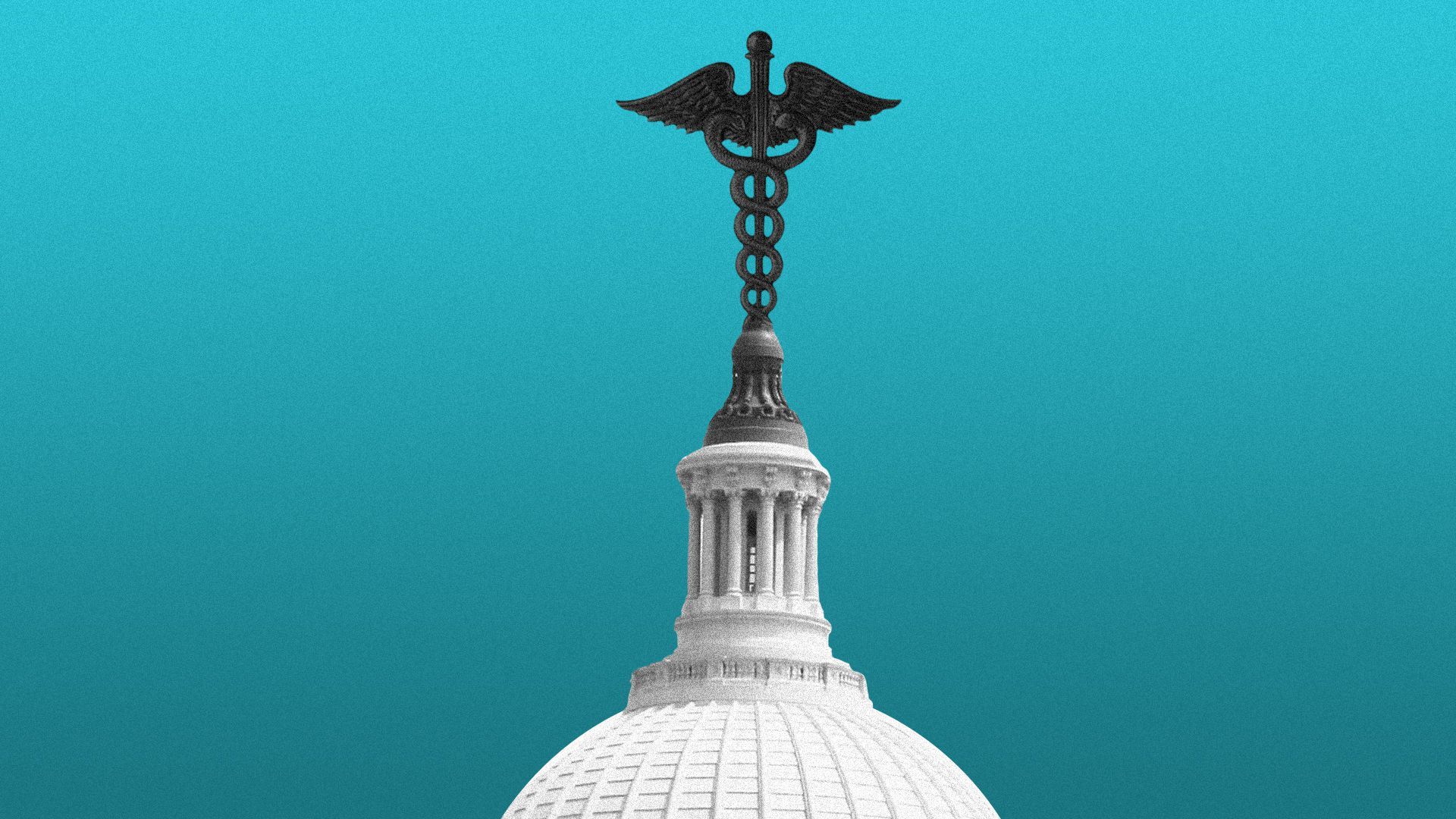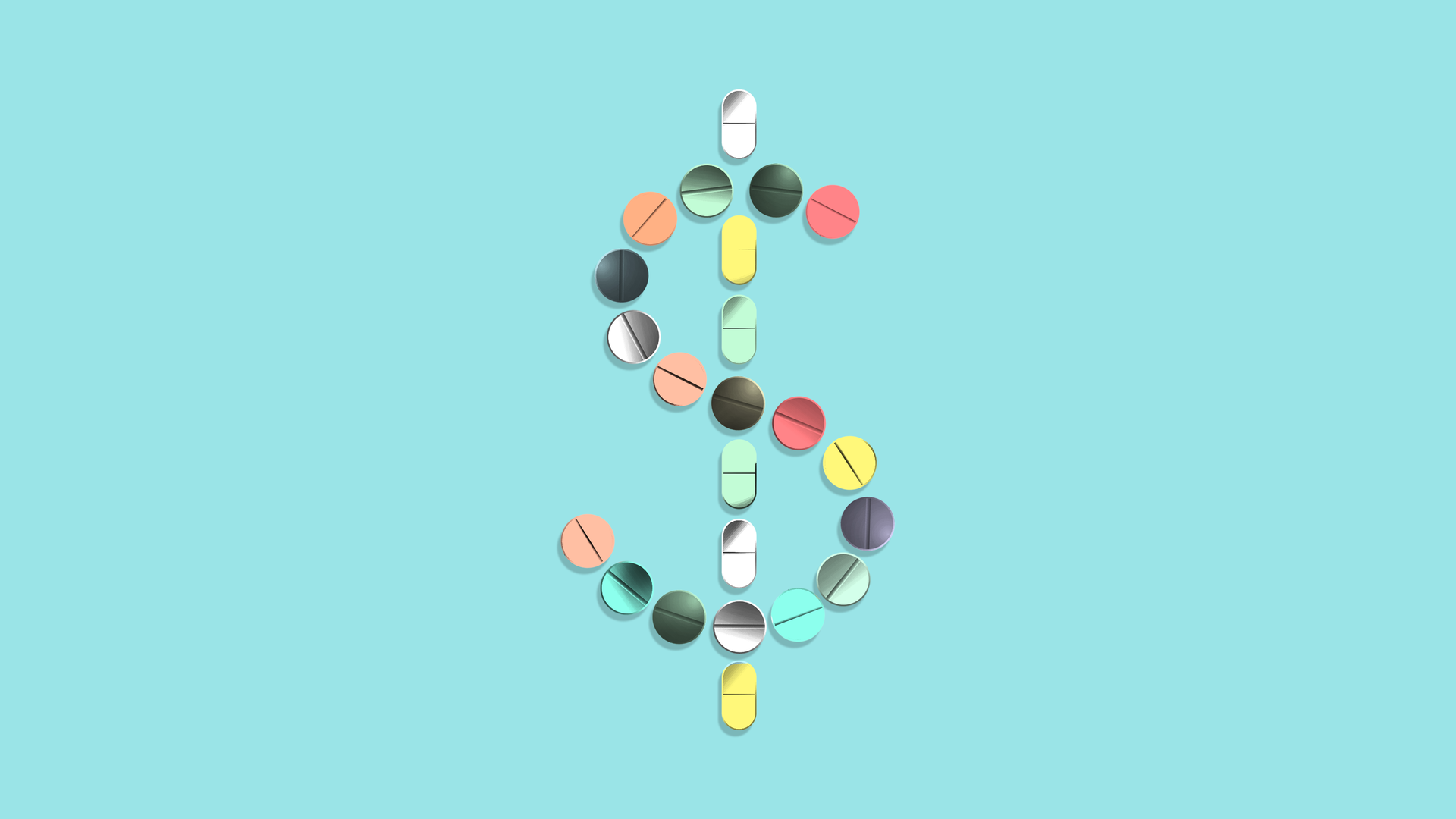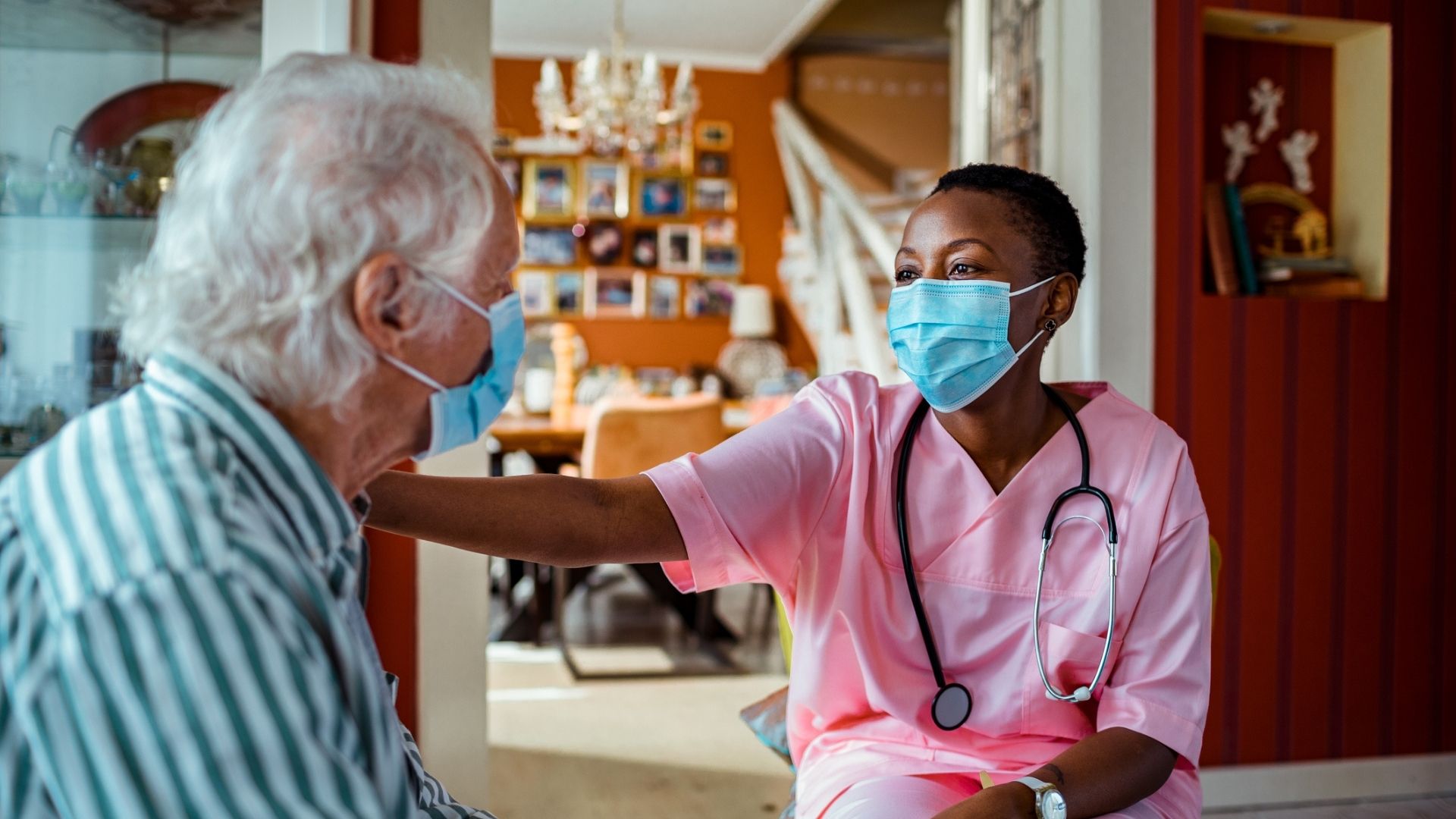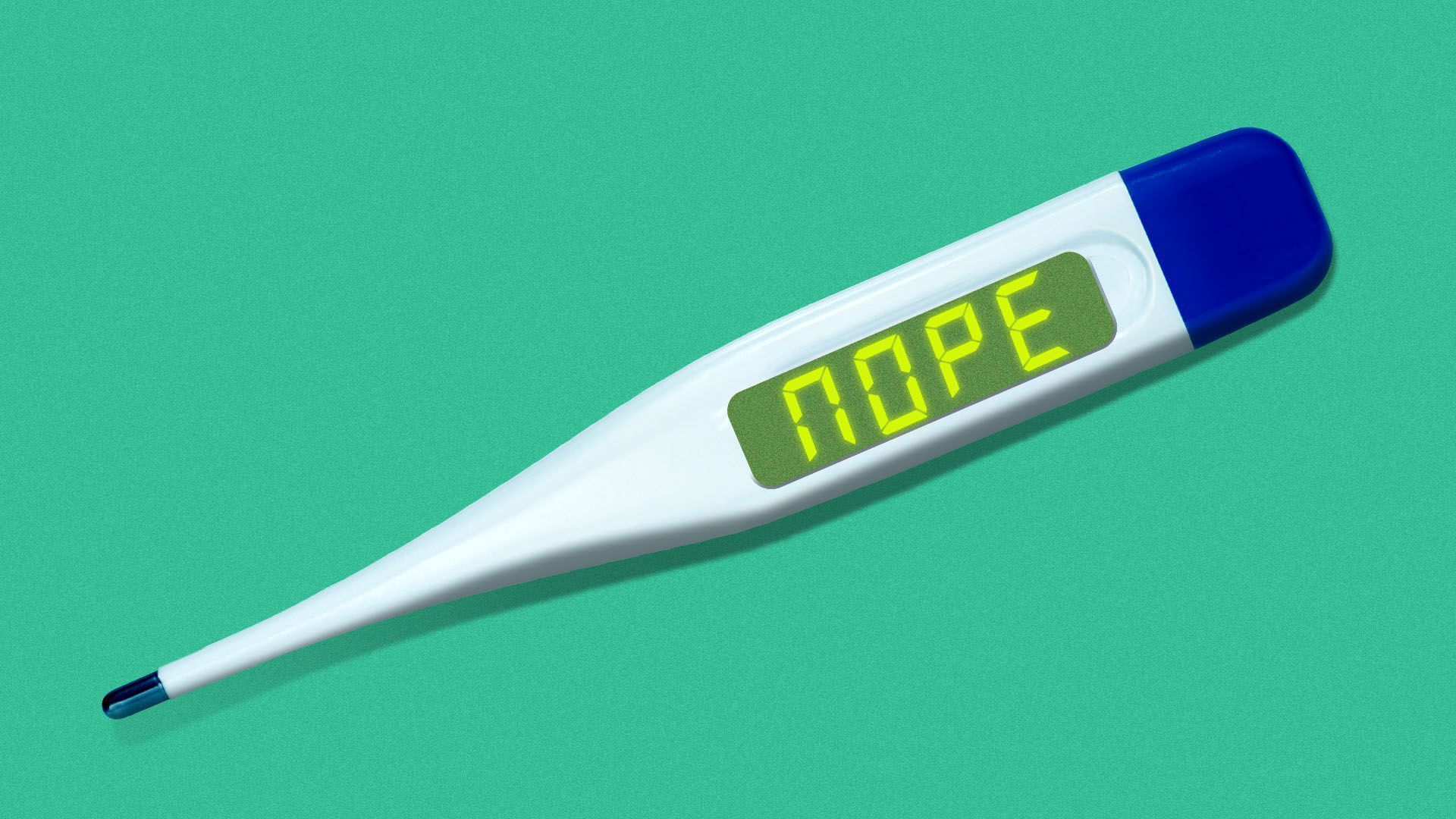| |
| |
| |
| Presented By PhRMA |
| |
| Axios Vitals |
| By Tina Reed ·Nov 03, 2021 |
| Good morning, Vitals readers. Today's newsletter is 1,067 words or a 4-minute read. 🗓 Join me tomorrow at 12:30pm ET for a virtual event on the future of the diagnostic journey for patients with rare diseases. Register here. |
| |
| |
| 1 big thing: Historic compromise on prescription drug prices |
 |
|
| Illustration: Shoshana Gordon/Axios |
| |
| Democrats have agreed on a top-level deal that would allow Medicare to negotiate the prices of some drugs. But moderates and pharma allies successfully took some of the bite out of liberals' preferred approach, Axios' Caitlin Owens and Alayna Treene report. Why it matters: If the deal ultimately becomes law, Democrats will be able to claim victory on what's been a major priority for years, and many Americans struggling to afford their medication would receive relief. The big picture: The deal hits on Democrats' three main pillars of drug price reform: It would allow Medicare to negotiate the prices of some drugs; it would put a cap on how much drugmakers can hike prices in both Medicare and the commercial market; and it would significantly reduce seniors' out-of-pocket costs. - But negotiations are only allowed for a narrow subset of drugs, which will ultimately reduce the amount of government savings the bill achieves.
- Experts say this approach will help blunt the bill's potential impact on drug companies' incentive to develop new drugs.
What they're saying: Key Democrats praised the deal yesterday, including Sens. Kyrsten Sinema, D-Ariz. and Bob Menendez, D-N.J. - Members who had wanted a more aggressive policy, such as House Energy and Commerce Chairman Frank Pallone, D-N.J., also put out statements of support.
The other side: PhRMA torched the watered-down plan. - "Under the guise of 'negotiation,' it gives the government the power to dictate how much a medicine is worth and leaves many patients facing a future with less access to medicines and fewer new treatments," PhRMA CEO Stephen Ubl said in a statement.
What we're watching: A two-page outline is not legislative text, and the devil will be in the details as the party fleshes out its agreement. The bottom line: "Democrats are taking an important step toward matching our policy walk with our collective multi-decade talk," Democratic strategist Chris Jennings said. Go deeper. |
    |
| |
| |
| 2. Drug industry may avoid big losses in deal |
 |
|
| Illustration: Lazaro Gamio/Axios |
| |
| While the pharmaceutical industry is voicing opposition to the latest drug pricing deal, analysts say it probably won't cut too much into their profits, Axios' Bob Herman writes. Between the lines: For instance, the proposal also includes an inflation rebate on companies that raise drug prices faster than inflation. But that could be "inconsequential for the industry" if the inflation rate continues to hover around 5%, drug analysts at SVB Leerink said in a note earlier Tuesday. - "The average commercial life before generic entry is estimated at 10–12 years," so the legislation may not cut that much into some drug sales, Bernstein pharmaceutical analyst Ronny Gal wrote in a note to investors Tuesday.
- And the first federal negotiated drug prices wouldn't go into effect until 2025 — plenty of time for lobbyists to further delay or kill the policy, and plenty of time "to adjust business models to negate meaningful impacts on earnings," pharma analysts at Raymond James wrote Tuesday.
The bottom line: The specific legislative text is important, but many industry analysts, like Gal, view this as a compromise that "seems designed to let legislators claim an achievement while granting pharma protection." Read more. |
    |
| |
| |
| 3. A hole in the framework |
| One glaring hole in Democrats' drug pricing outline: It says that drug companies that refuse to negotiate with Medicare will be subject to an excise tax. But they don't say what that tax will be, Caitlin writes. Why it matters: If the penalty for refusing to negotiate isn't large enough, drugmakers simply won't comply, undermining the entire concept. What they're saying: "Without knowing the penalties for not complying with negotiation it is impossible to know what this means for incentives facing drug makers. And that is the tip of the iceberg. What does it even mean to not comply?" American Enterprise Institute health economist Ben Ippolito told Axios. - "So far we have a very very basic framework. What this saves taxpayers or what it means for the future of the drug market are almost entirely up in the air."
|
    |
| |
| |
| A message from PhRMA |
| Fixing health care means putting patients first |
| |
 |
| |
| From out-of-pocket costs, to deductibles, to hospital bills – the most vulnerable patients face challenges. 3 in 10 Americans who have insurance still face a financial barrier to care. We need to make the cost of medicine more predictable and affordable. Learn more. |
| |
| |
| 4. The kids' vaccines mandate question |
 |
|
| Illustration: Aïda Amer/Axios |
| |
| Now that the CDC has recommended COVID vaccines for 5-11-year-olds, the next debate could be about whether schools should mandate them for that age group, Axios' Marisa Fernandez writes. Why it matters: Members of the advisory boards for both the CDC and the FDA raised concerns their votes might ultimately trigger mandates in schools. - "I'm just worried that if we say yes, that the states are going to mandate administration of this vaccine to children in order to go to school, and I do not agree with that," FDA committee member Cody Meissner said on Friday.
State of play: The federal government authorized shots for 12-17-year-olds nearly six months ago, and so far, only five of the 200 largest school districts have mandated shots for those kids. - All five of those districts are in California.
- A handful of other districts, mostly in or near big cities including New York City, Philadelphia, Chicago and Washington, D.C., require high school athletes to be vaccinated, Dennis Roche, co-founder of school tracking site Burbio, tells Axios.
Reality check: Schools would be up for a huge challenge if they do decide to pursue mandates for 5-11-year-olds, Bree Dusseault, principal at the Center on Reinventing Public Education, tells Axios. |
    |
| |
| |
| 5. Unequal vaccine access persists |
 |
|
| A woman in Bangladesh gets the Pfizer-BioNTech vaccine. Photo: Piyas Biswas/SOPA Images/LightRocket via Getty Images |
| |
| Shot: "Rich countries have given out more boosters in three months than poor countries have given total doses all year," the Financial Times reports. Chaser: "Most of the negotiations for doses in the next year are coming from high-income countries and some middle-income countries," Pfizer CEO Albert Bourla said on an earnings call yesterday. - "I think we are producing enough. But for the low- and middle-income countries to receive ... a very severely discounted price ... they need to place orders ... The low- and middle-income countries will be behind in deliveries because they didn't place their orders."
Share this story. |
    |
| |
| |
| 6. Sick days disappear in remote working world |
 |
|
| Illustration: Sarah Grillo/Axios |
| |
| Before the pandemic, if you woke up with a runny nose or a tickle in your throat, it was a simple enough decision to stay home and avoid infecting your coworkers. Why it matters: Working through sickness and fatigue makes it harder for people to recover quickly and completely, prolonging the harm to their health and productivity. - By the numbers: In a survey conducted by OnePoll, two in three Americans say they feel less inclined to take time off for sore throats and stuffy noses when working from home. And 70% say they've worked while sick during the pandemic.
|
    |
| |
| |
| A message from PhRMA |
| Fixing health care means putting patients first |
| |
 |
| |
| From out-of-pocket costs, to deductibles, to hospital bills – the most vulnerable patients face challenges. 3 in 10 Americans who have insurance still face a financial barrier to care. We need to make the cost of medicine more predictable and affordable. Learn more. |
| |
| 😎 Love this newsletter? Tell your friends to subscribe! |
 | | It'll help you deliver employee communications more effectively. | | |









No comments:
Post a Comment